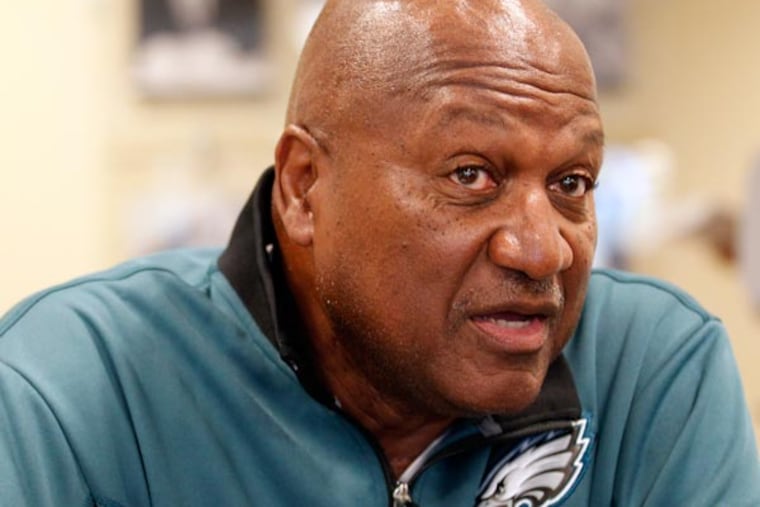Ted Williams has ends in sight
Eagles' assistant, who coached running backs for 16 years, is switching to tight ends under new coach Chip Kelly.

TED WILLIAMS is the calm hand in the middle of the revolution. The longest-tenured assistant coach in the history of the Eagles franchise, Williams arrived here as the tight ends coach in 1995 and 1996 under Ray Rhodes. Now, a lifetime later - and after 16 years coaching running backs named Ricky Watters, Duce Staley, Brian Westbrook and LeSean McCoy - Williams is coaching tight ends again in 2013 under Chip Kelly.
To say that a few things are different would be an embarrassing understatement. Or, as Williams said, reeling off the names of his 1995-95 tight ends, "Ed West. Jimmie Johnson. Chad Lewis. Jason Dunn."
The position has changed, as everyone knows - and especially in the last couple of years, following on the success that New England has had. When you compare Williams' first year as a tight ends coach with last year, you see:
The number of NFL tight ends who had even one receiving yard increased by 12 percent. The number who had at least 100 receiving yards increased by 14 percent. And the number who had at least 500 yards increased by 118 percent.
Yes, more than double.
"The difference is, you actually expect the tight end to go out and win a route today," Williams said. "Back then, you expected them to get open. But now, you're advanced because they're so much better athletes. They're not just blockers. They're pass receivers. They're route runners. Everybody on the field is a viable target. You have to be good at it.
"It's like anything else - good trends are followed, whether it's General Motors or the NFL. New England brought the concept into the league and had success with it and everybody else looked at it and said, 'Can we do that, too?' And now, you expect your tight end to be an athlete as opposed to being a big guy who runs short routes."
Williams has a mix of different types to look after this season. In Brent Celek, he has a rugged guy who gets things done downfield. In rookie Zach Ertz, he has a downfield guy who hasn't proven the ruggedness part. James Casey, who had his knee scoped and figures to be ready for training camp, is a hybrid kind of guy who needs to prove his skills as a true receiver. Clay Harbor is a holdover who needs to improve in every way.
With all of them, Williams said, the goal is to marry the two skills - the ability to block in the run game and be a legitimate downfield threat. But people who see Celek as someone coming off of a disappointing season (in part because of injuries), and who see Ertz as a high draft choice, and who think anything is preordained here, well, they need to listen to Williams.
Because while there is a period of adaptation going on - even for a coach like Williams, who has never worked for a coach who emphasized tempo as much as Chip Kelly is this spring - there are certain truths.
This is No. 1:
"One thing has not changed in all of my time," Williams said. "That is, you won't know anything until they put on the big-boy pads. Only when that happens are you able to say, 'Well, he can do this,' or, 'He can do that,' or, 'He's not prepared to do something at this time.'
"At the position I'm coaching, it's important to be athletic and agile - but that's easy to do when you've got on shorts. If you put the pads on, then we'll see how athletic and agile you are when people are hitting you and banging you around. Can you still be athletic? Agile? Productive?
"The jury is out until I see what you can do."
The truth is that more than one of them will be on the field a lot of the time, and Williams said you could possibly see three of them at a time. Versatility remains the watchword. It is hard to imagine some of the 1995 guys succeeding now, but Williams isn't so sure.
"Ed West could play today," he said. "Jimmie Johnson could play today. Why? Because they played in the offenses of distinction in their day. Jimmie played with Joe Gibbs in Washington. Ed West played with Lindy Infante in Green Bay. They're good enough, had they been raised this way, to play at this level.
"People adapt to what they're asked to do. They were bigger and stronger then because they were blockers. They were in the trenches. You couldn't be a little guy and survive. It's an adaptability issue - what are you asking me to do?
"What happens to little backs in this league who are fast and quick? They get hit and they realize they have to get bigger. Their speed and quickness diminish because they're trying to survive. People can adapt."
Which is what this spring for the Eagles is all about.
On Twitter: @theidlerich
Blog: ph.ly/DNL